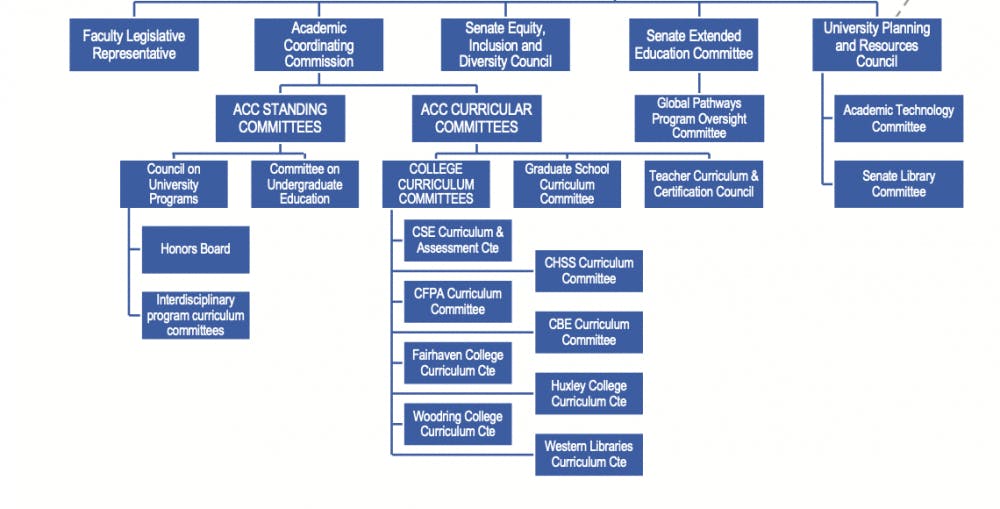Western engineering programs add 2 credits needed to graduate

By Ryan Morris
What will students learn from this course that will have a positive impact after college? This is the question higher education consultant Dee Fink encourages professors to consider when designing courses and majors.
The engineering department considered this question and the university’s inclusion goals as they proposed course and major changes to manufacturing engineering courses for the 2021-22 academic year.
These alterations included changing courses in both the manufacturing engineering and plastic and composites programs, as well as transferring some manufacturing engineering programs to plastic and composites, associate professor Derek Yip-Hoi wrote in an email to The Western Front.
“[These course changes] are designed to support efforts to foster a greater sense of belonging amongst our pre-majors with the goal of improving equity, inclusion and diversity in our majors,” Yip-Hoi wrote.
Two values inform the university’s goals — fostering a caring and supportive environment with fair treatment and respect, and pursuing equity and justice, according to the Office of the Provost. The course changes, alongside the added 100-level course, are centered around equity and inclusion, Love said.
“[Engineering course 101] is designed to introduce students to the field of engineering and design with a focus on pedagogical practices that improve equity, inclusion and diversity,” according to the proposal on Curriculog.
The College of Science and Engineering is one of three colleges that presented curricular changes at the Academic Coordinating Commission meeting on Nov. 24. The other colleges with curriculum changes are the College of Fine and Performing Arts and the College of Humanities and Social Sciences.
The Academic Coordinating Commission approves any curricular changes, cancellations or additions, said Academic Coordinating Commission Chair Brooke Love. Any faculty member can present changes, which are then approved by their department, the college curriculum committee and finally the Academic Coordinating Commission. There are three levels of approval because the curriculum changes need to work for every department involved, Love said.
Faculty make an automated impact report for each changed course, Love said. The impact report electronically scans the university’s catalog to find other courses impacted by the change in the altered course, she said.
When the College of Science and Engineering Curriculum and Assessment Committee decided to cancel Manufacturing 465, they also had to look at which courses listed 465 as a prerequisite, according to the proposal on Curriculog. Manufacturing 465 was reassigned at a third-year level, Love said.
A new prerequisite can replace an old one, Love said. The Academic Coordinating Commission exists to make sure nothing falls through the cracks or has a negative impact on students, she said.
Western engineering graduate Clark Weitkamp said he’s concerned about engineering students’ track to graduation. Weitkamp graduated in four years with the help of Running Start, but said he considers the engineering program to be a five-year track.
With changes to the engineering programs, the major has increased by two credits, Love said.
“They introduced new courses that are focused around equity and inclusion, so it seemed to us like a good trade-off,” Love said.
The university does track the time it takes to complete a degree, but it is not part of the Academic Coordinating Commission, she said. Programs that take over four years can use that knowledge to advocate for more resources, but it will not encourage the program to cancel courses, Love said. The Academic Coordinating Commission doesn’t want to offer a major not up to the standards of the discipline, she explained.
Third-year Western student Rebecca Fagan said she is more concerned with class availability than her major’s course load.
When a degree takes longer than four years, programs ask for more funding and professors to allow for more sections of each course, Love said. The Academic Coordinating Commission relies on the departments in question to decide which courses are most important for the major, because they are the experts in their field, she said.
The Academic Coordinating Commission has a deadline of March 9 to solidify all catalog changes for the 2021-22 academic year, according to the curriculum timeline.
The most important factor to consider when designing and altering courses and majors is the effect on students after college, Fink said.
“It’s a means to an end, and the end is a life enhanced by high quality learning,” Fink said.





